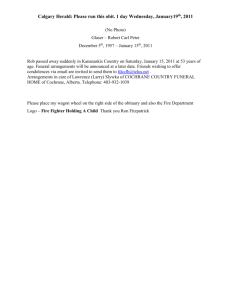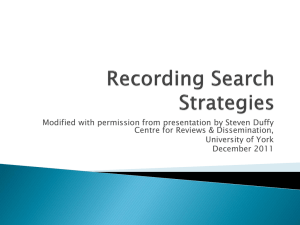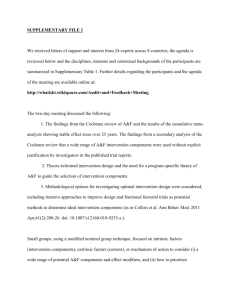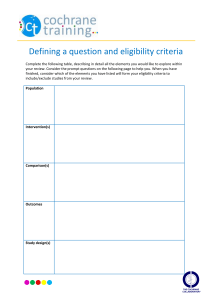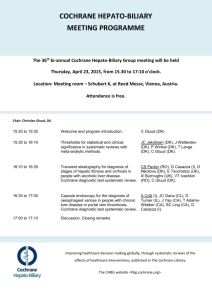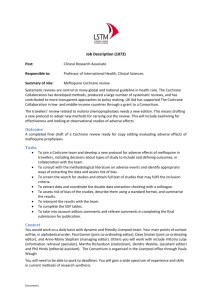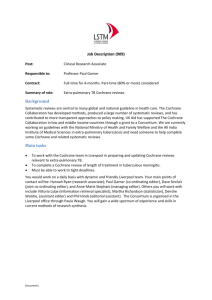Registering discipline-based or profession
advertisement
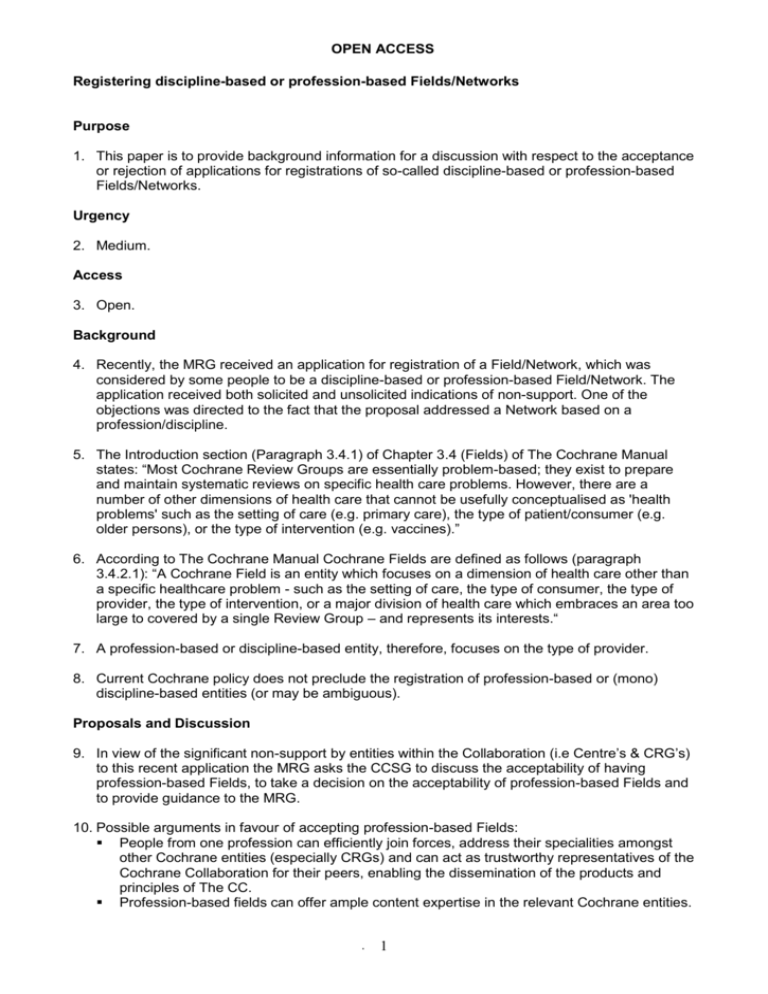
OPEN ACCESS Registering discipline-based or profession-based Fields/Networks Purpose 1. This paper is to provide background information for a discussion with respect to the acceptance or rejection of applications for registrations of so-called discipline-based or profession-based Fields/Networks. Urgency 2. Medium. Access 3. Open. Background 4. Recently, the MRG received an application for registration of a Field/Network, which was considered by some people to be a discipline-based or profession-based Field/Network. The application received both solicited and unsolicited indications of non-support. One of the objections was directed to the fact that the proposal addressed a Network based on a profession/discipline. 5. The Introduction section (Paragraph 3.4.1) of Chapter 3.4 (Fields) of The Cochrane Manual states: “Most Cochrane Review Groups are essentially problem-based; they exist to prepare and maintain systematic reviews on specific health care problems. However, there are a number of other dimensions of health care that cannot be usefully conceptualised as 'health problems' such as the setting of care (e.g. primary care), the type of patient/consumer (e.g. older persons), or the type of intervention (e.g. vaccines).” 6. According to The Cochrane Manual Cochrane Fields are defined as follows (paragraph 3.4.2.1): “A Cochrane Field is an entity which focuses on a dimension of health care other than a specific healthcare problem - such as the setting of care, the type of consumer, the type of provider, the type of intervention, or a major division of health care which embraces an area too large to covered by a single Review Group – and represents its interests.“ 7. A profession-based or discipline-based entity, therefore, focuses on the type of provider. 8. Current Cochrane policy does not preclude the registration of profession-based or (mono) discipline-based entities (or may be ambiguous). Proposals and Discussion 9. In view of the significant non-support by entities within the Collaboration (i.e Centre’s & CRG’s) to this recent application the MRG asks the CCSG to discuss the acceptability of having profession-based Fields, to take a decision on the acceptability of profession-based Fields and to provide guidance to the MRG. 10. Possible arguments in favour of accepting profession-based Fields: People from one profession can efficiently join forces, address their specialities amongst other Cochrane entities (especially CRGs) and can act as trustworthy representatives of the Cochrane Collaboration for their peers, enabling the dissemination of the products and principles of The CC. Profession-based fields can offer ample content expertise in the relevant Cochrane entities. . 1 OPEN ACCESS Having profession-based entities is in line with principles 1 (Collaboration), 2 (Building on enthusiasm of individuals) and 10 (Enabling wide participation) of The Cochrane Collaboration. The CC does already have Fields that might be considered as profession-based: Primary Health Care Field and the Occupational Health Field, which can be viewed as a precedent for the registration of profession-based Fields. 11. Possible arguments against accepting profession-based Fields: There are other ways of involving particular professions than formal entities. Allowing profession-based Fields opens the door for an insurmountable number of new Fields, making The CC, which is already a quite complex organisation, an even harder and less efficient organisation to manage. The list of stakeholders is ever-growing; CRGs can hardly cope with ensuring they are covering all those stakeholders’ issues in their reviews. Mono-disciplinary Fields can be counterproductive, because health care delivery should not be done in isolation, but in multi-disciplinary collaboration. There could be over-representation of contributors of a specific discipline (fractions could develop for political reasons). There would be a danger of duplication of effort (people from a discipline duplicating work from e.g. CRGs). One could question the general idea of having separate groups for different healthcare professional disciplines. Different disciplines should be involved in each Cochrane review. 12. Alternatives for involving professions or disciplines into Cochrane activities (especially the preparation of reviews): Ensure that the profession is represented well in CRGs (e.g. as authors, editors, external referees, or handsearchers) Summary of recommendations 13. It is recommended that the CCSG decides on one of two alternatives: 13.1. Decide in favour of enabling the registration of profession-based Fields. 13.2. Decide against enabling the registration of profession-based Fields. Resource implications 14. No direct resource implications are involved. Indirect resource implications pertain to a possible increase of sponsored registrations of one entity member for Cochrane Colloquia when many profession-based Fields would be registered. . Impact statement 15. If CCSG recommends option 13.1, the Collaboration might face many new applications for new Fields. No further actions are required. 16. If CCSG recommends option 13.2, the CCSG must inform all members of The Cochrane Collaboration about their arguments for not allowing the registration of profession-based Fields, the Cochrane Manual and other relevant documents should be updated accordingly (precluding the establishment of profession-based Fields). Decision required 17. It is recommended that the CCSG decides either for 13.1 or for 13.2. Heather Maxwell and Rob Scholten, co-convenors MRG 10 March 2008 . 2
